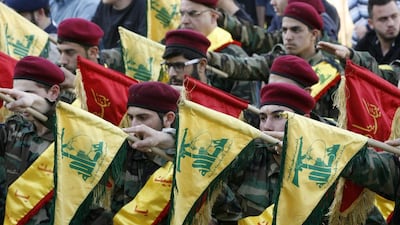The West tends to look at the chaos of Iraq and Syria through the prism of jihadist armed groups such as ISIL and Jabhat Fateh Al Sham. But these are not the only groups that pose a threat on both the regional and the international scene, as the mounting influence of factions such as Hizbollah and the Iraqi Popular Mobilisation Units illustrate.
Hizbollah has extended its influence over Lebanon thanks to its successful resistance against Israel, its large military arsenal and an extensive service network within its polity.
The ascendancy of Hizbollah in Lebanese affairs has only increased since the 2005 killing of the former prime minister Rafiq Hariri, allowing it greater control over the state.
Between 2006 and 2008, Lebanon faced one of its worst political crises when a Hizbollah-led opposition demanded more power and a veto over government decisions. Hizbollah took to the streets in violent clashes in 2008 after the government attempted to ban its private telephone network and reassign Beirut airport's security chief, who was close to the opposition.
In 2012, Hizbollah agreed on the Baabda Declaration, advocating a policy of dissociation from regional and international conflicts by the Lebanese government led by caretaker prime minister Najib Miqati, before going into Syria to fight alongside the forces of Bashar Al Assad.
For much of the past two years, Hizbollah has blocked the election of a new president, clearly demonstrating that it remains the dominant political and military force in Lebanon.
The PMU, Iran’s new proxy in Iraq, appears to be walking in the footsteps of Hizbollah.
While the PMU is officially subordinated to the office of Haider Al Abadi, Iraq’s prime minister, its loyalties lie with the Iranian Revolutionary Guards.
According to expert Renad Mansour, the fight against ISIL has elevated the status of PMU’s leaders, who are now vying with former primer minister Nouri Maliki for Iran’s patronage. Mansour also believes that the goal for this coalition is to re-emerge on to the post-ISIL political scene in next year’s provincial polls and the 2018 parliamentary elections.
Both the PMU and Hizbollah are building on their ability to stand up to other forces to acquire greater military and political power.
Both organisations are defined by their Shiite identity, a narrative focused on the takfiri and Israeli threat and more importantly their allegiance to Tehran, thus contributing to Iran’s fragmenting policy across the Middle East.
Given some Arab states are perceived as increasingly illegitimate and incapable of providing security or even basic services, violent non-state armed groups are positioning themselves as alternatives.
In this framework, Hizbollah and the PMU will seek to secure dominance in foreign and security policy and more importantly to remain above the state rather than to be the state.
Not only do such groups pose political and security threats at both local and regional levels, but they also further the problem of weak states across the Levant. These groups are feeding the chaos on which jihadi organisations thrive, while appearing to attempt to become new regional power brokers.
Mona Alami is a non-resident fellow at the Atlantic Council’s Rafik Hariri Centre for the Middle East

